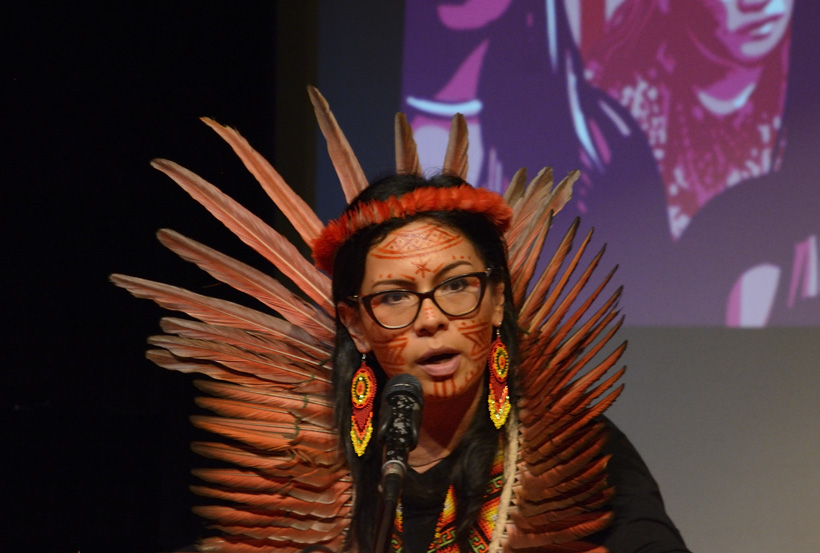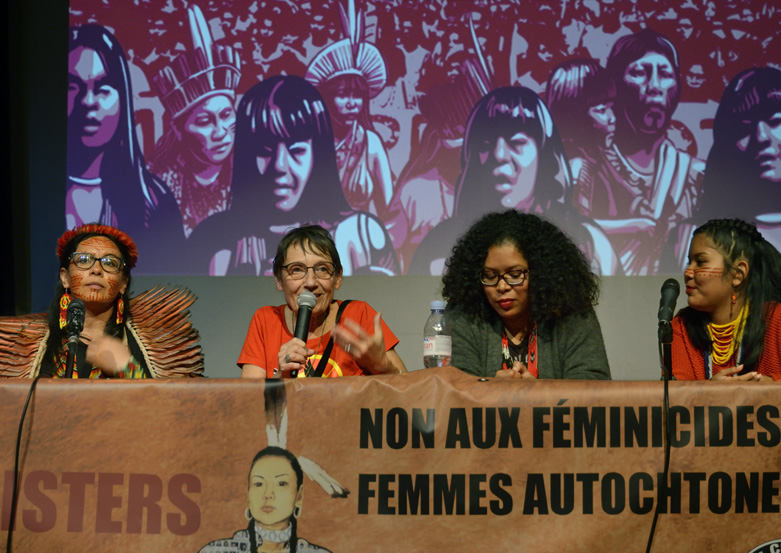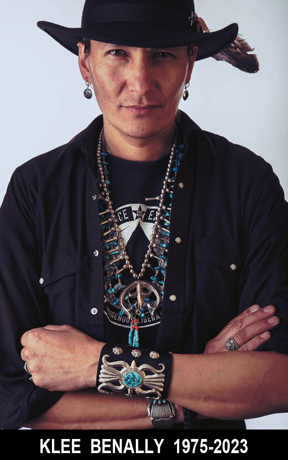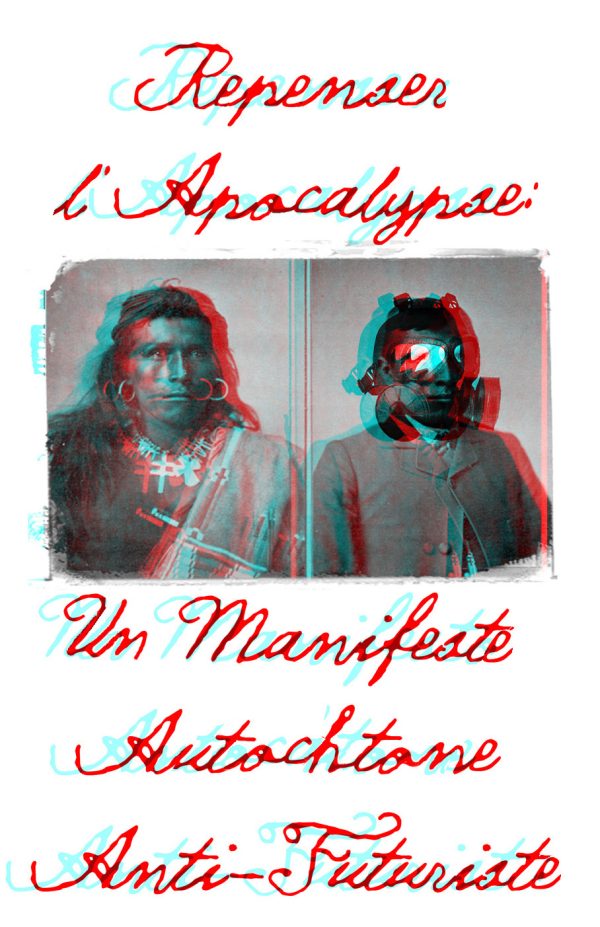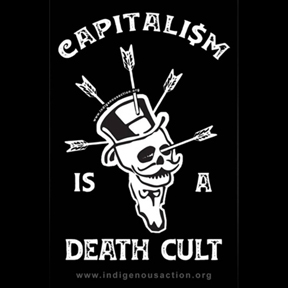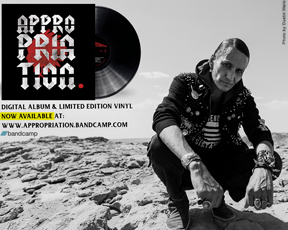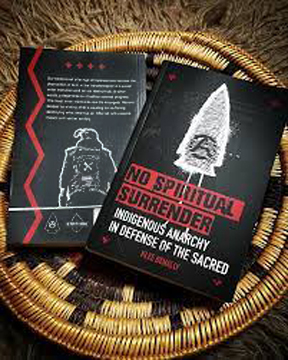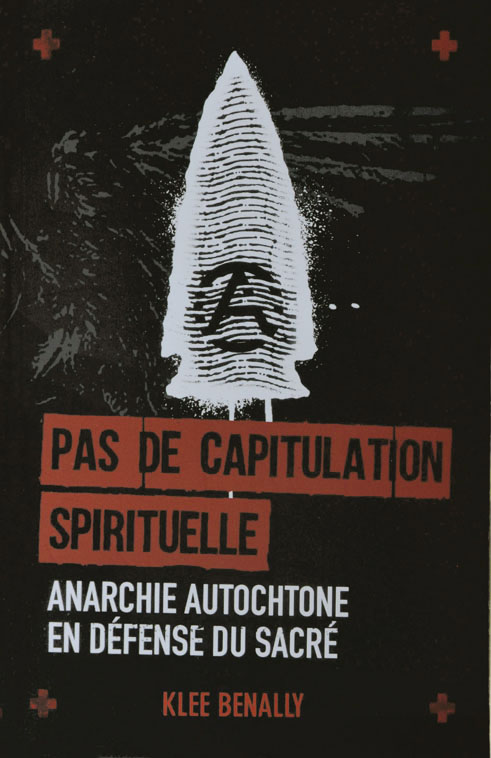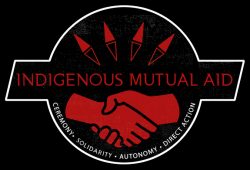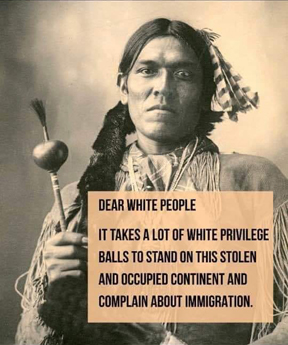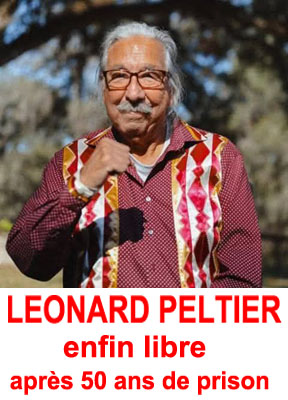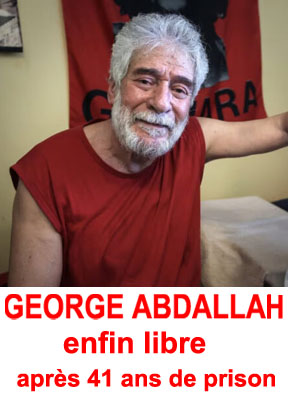Daiara Tukano, from the Tukano People of Brazilian Amazonia, was invited by the CSIA-Nitassinan, in October 2019. Her speech is a masterpiece in denouncing colonialism and capitalism. She delivered it in French, and I hope that my English translation is good enough to reflect her ideas.
Daiara is an artist, painter and musician. And a Warrior.
Christine Prat
Daiara Tukano Français
October 12th, 2019
Translation and photos Christine Prat
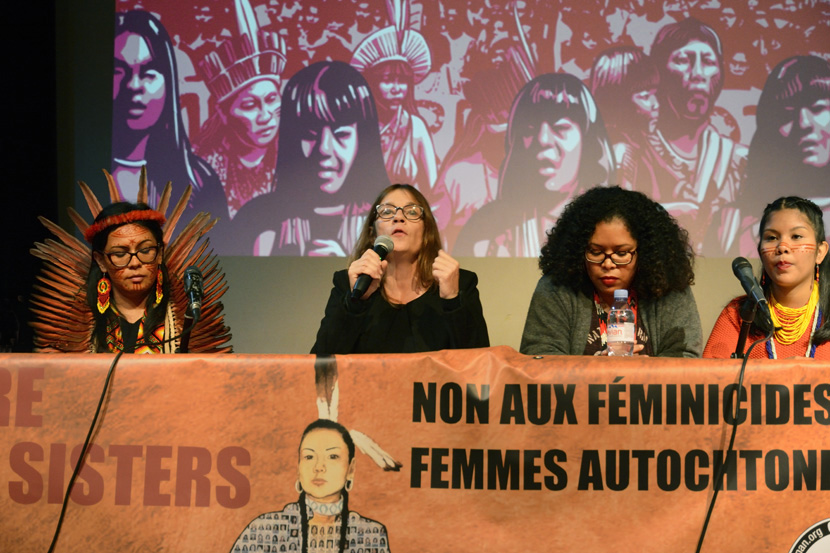 Anne Pastor, journalist: Let’s say that he [Bolsonaro] has taken a very clear position. I think that during his campaign, he even said that the laws protecting the forest were a hindrance for the economical development of the country, and he promised to break them. We feel that he is true to his words.
Anne Pastor, journalist: Let’s say that he [Bolsonaro] has taken a very clear position. I think that during his campaign, he even said that the laws protecting the forest were a hindrance for the economical development of the country, and he promised to break them. We feel that he is true to his words.
Daiara: That person seems, at least, to be very determined to do what he says, it was not necessarily the case with the previous government. But Amazonia has always been a target for all kinds of attacks, and the struggle of Indigenous Peoples in Brazil has been going on continuously for at least 519 years. The issue is not so much a government being more violent than another, violence is permanent. However, it has to be said that, at the moment, violence becomes institutionalized, through the discourse of the Head of State, which confers a kind of impunity to all the crimes committed on our territories and against our populations.
Journalist: He is even particularly lenient when it concerns the clear cutting of the forest!
Daiara; Yes! I am not sure that it is interesting to talk about that person, right at the beginning of this discussion. The Indigenous Movement has much more to say. Moreover, the title of the present discussion is ‘Our body, Our territory, Our mind’. ‘Our Territory’ was the name of the first Indigenous Women March, in August, in Brasilia, a march that was a very important moment, as women came from about everywhere in the country. We gathered 1500 women from everywhere, to walk and confront the situation created by the present government. Of course, Amazonia has always been endangered, at least for 500 years. In our territories, there is the exploitation of what is called natural resources, and also a continued colonial, racist relationship, with colonizers still trying to invade all our living spaces, not only the physical territories, the earth itself, but also to deny the existence of Indigenous Peoples. Thus, it is much more complicated than just the Bolsonaro government. It is clear that we have now reached a situation of deforestation that puts the whole forest in immediate danger. Some thirty years ago, when the Eco 92 took place in Rio de Janeiro, there were already 1000 warnings, showing that deforestation in Amazonia had a limit, that the forest was getting weaker, that it had reached an irreversible point, while at the time the limit was considered to be the clear cutting of 20% of the forest. In only one year of Bolsonaro government, with that impunity it guarantees to big farmers, big landowners, and the promise of mining, as well as attempts to soften all environmental rights to allow that exploitation, we are already far over those 20% that were supposed to maintain the forest standing. And it is not by chance that it is burning everywhere, through criminal actions, and it is not by chance either that the Big Industry, the Big Agribusiness and the Mining industry exert more and more pressure on the government – it was already happening under previous governments – to develop a discourse, in which, again, ‘economic progress’ does not give a damn about Indigenous Peoples lives, the life of the forest and everything in it.
Journalist: I thought it was important to talk about the present context and to state that indeed, since 2018, the process accelerated and that we are now confronted with a situation of real danger […]
So, there is indeed a climate of insecurity and violence that unfortunately exists in Brazil, in Amazonia…
Daiara: As I said before, this story has long existed, it is the history of colonization, the history of genocide, and, in the region where my People live, at the border between Brazil, Colombia and Venezuela, of all kinds of trafficking. This territory is also a target for this government to exploit mining, mainly near the Pico Da Nablina, where they mine for niobium, a metal that appears to be very expensive. But that exploitation process has always been pushed through a vision of development. And it must be said that colonization almost necessarily implies racism, which has become structural in our society and has created several mechanisms to weaken our Indigenous societies. It implies the denial of our identity, our culture, our languages, and the lack of all possible public policies by the State. Thus, our populations still have very little access to education, health, transportation, communication, etc., and are still deliberately made invisible by the media and those who own them, in government and in the big industry. Through my work, I see that it is the same everywhere in the world, be it in Siberia, where the forest is burning too and where territories are also attacked by illegal gold mining, in Canada or in the United States, where they have the same situation with oil exploitation. It is the same situation everywhere, it is the ongoing genocide, colonialism and racism, which is taboo in a society that believes it is globalized and post-colonial. For us, reality is quite different from what people learn at school and even in universities. Nobody talks about it, thus we must talk about it.
Journalist: This is why I said, at the beginning of our discussion, that it is time to listen to you, all the more so that you are a kind of ideas laboratory for tomorrow, at least as far as Amazonia is concerned. Anyway, it is saving the future of our planet as well and you, American Indians, but also the Peoples of Siberia, take a stand as the keepers of this nature. We must rethink the world and rethink its relationship with nature.
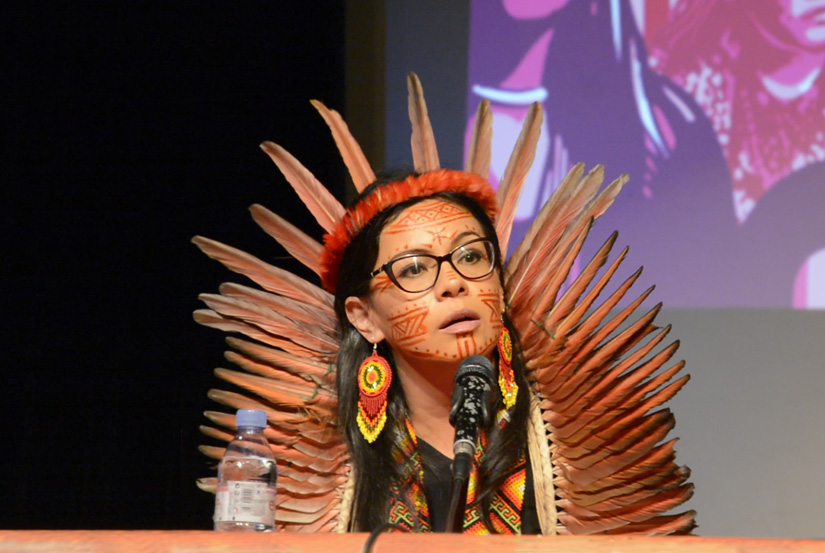 Daiara: For my part, I find perfectly cynical that XXIst century idea of asking Indigenous people how to save the planet. And I don’t like that word “American Indians”, because India is on another continent, and it is possible to use other words. So, if today 80% of the biodiversity on earth is on Indigenous Territories, it is not by chance, it is because of our culture, our relationship to the world, and the fact that we consider that we are ourselves part of Nature, not the owners of Nature. What is at stake is a series of values – we can use a dirty word – an epistemology, which is different in its relationship with the universe, and if we still exist as Indigenous Peoples, it is precisely because we have a way of thinking, an identity, a relationship with the world that have maintained themselves, that continue to exist. We have not yet been totally colonized, thus colonialism – too bad for you – is not totally realized, and we still resist, our existence is our resistance, and what we have to share is the possibility to have other values. I find very interesting that people started to talk, to think at last about colonization, as we are all children of colonization. We are not going to question history here, we are not going back in time, it is impossible. But when we talk about “de-colonial” thinking, we denounce a lot of violence but we are not proposing much. Thus, for my part, I prefer “counter-colonialism”, and what I mean by that is to share other values, those which exist in our societies. Sharing does not mean forcing other ideas upon people, but rather to share life relationships. Otherwise, some will say “What? Now Indigenous people want to colonize Europe!”, but we have little interest in that, it is a quite infertile territory. In opposition, what is fertile is the people’s interest and their desire to do something else. And what I can say about the forest, for instance – I talked about it in England, with our allies of Extinction Rebellion, who are making some noise everywhere – is that, although it is necessary and very important to stick posters and denounce violence, a forest cannot be planted with posters, and there is no B planet. It is important to love oneself and each other, it is important to plant a forest, and in order to plant a forest, you have to accept changes in your way of life. A forest has to be planted at least twenty years before it begins to be born. Thus, it is not a movement for a weekend, it is not something to just make a nice movie about, a documentary or a beautiful photo and then claim to support the Indigenous Peoples’ struggle. You really need to put your hands and feet in the soil and plant and dedicate yourself to keep life on this planet, as we all depend on each other.
Daiara: For my part, I find perfectly cynical that XXIst century idea of asking Indigenous people how to save the planet. And I don’t like that word “American Indians”, because India is on another continent, and it is possible to use other words. So, if today 80% of the biodiversity on earth is on Indigenous Territories, it is not by chance, it is because of our culture, our relationship to the world, and the fact that we consider that we are ourselves part of Nature, not the owners of Nature. What is at stake is a series of values – we can use a dirty word – an epistemology, which is different in its relationship with the universe, and if we still exist as Indigenous Peoples, it is precisely because we have a way of thinking, an identity, a relationship with the world that have maintained themselves, that continue to exist. We have not yet been totally colonized, thus colonialism – too bad for you – is not totally realized, and we still resist, our existence is our resistance, and what we have to share is the possibility to have other values. I find very interesting that people started to talk, to think at last about colonization, as we are all children of colonization. We are not going to question history here, we are not going back in time, it is impossible. But when we talk about “de-colonial” thinking, we denounce a lot of violence but we are not proposing much. Thus, for my part, I prefer “counter-colonialism”, and what I mean by that is to share other values, those which exist in our societies. Sharing does not mean forcing other ideas upon people, but rather to share life relationships. Otherwise, some will say “What? Now Indigenous people want to colonize Europe!”, but we have little interest in that, it is a quite infertile territory. In opposition, what is fertile is the people’s interest and their desire to do something else. And what I can say about the forest, for instance – I talked about it in England, with our allies of Extinction Rebellion, who are making some noise everywhere – is that, although it is necessary and very important to stick posters and denounce violence, a forest cannot be planted with posters, and there is no B planet. It is important to love oneself and each other, it is important to plant a forest, and in order to plant a forest, you have to accept changes in your way of life. A forest has to be planted at least twenty years before it begins to be born. Thus, it is not a movement for a weekend, it is not something to just make a nice movie about, a documentary or a beautiful photo and then claim to support the Indigenous Peoples’ struggle. You really need to put your hands and feet in the soil and plant and dedicate yourself to keep life on this planet, as we all depend on each other.
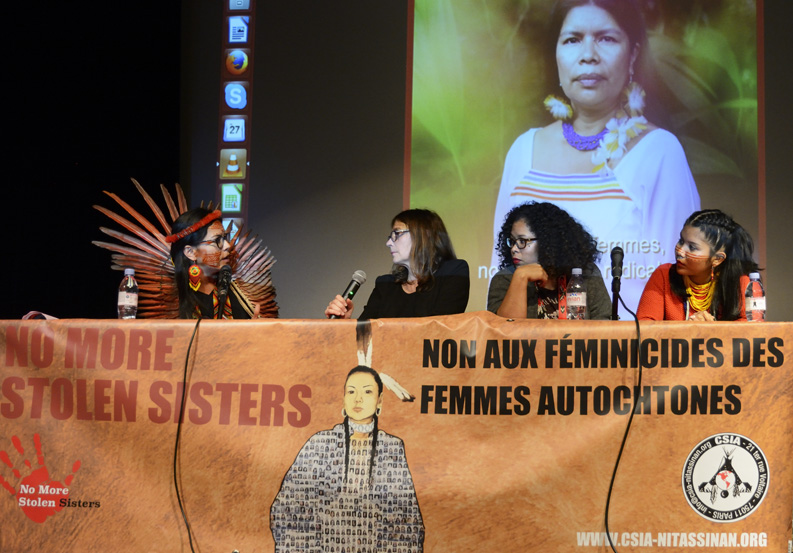 Journalist: Thus, you do agree with me, you don’t use the same words, but you totally agree with what I said before. So, let’s talk about those rights of nature. And I would like to speak about Ecuador, a country where there is a lot of mining, but has been the first to include the Rights of Nature in its Constitution. The Sarayaku, a Native People, Kichua, want to do more: in July 2018, they proposed the Declaration of the Living Forest and they wish that the United Nations recognize that new category in their environment program. For over twenty years, that small community of 1200 people, also struggle to defend their territory, the biodiversity, their immaterial patrimony, against intruding by all kinds of exploitation projects and today, they are a model and mainly devote themselves to promoting that vision of cosmos in which, as you said so well, the forest is a living being, is sacred, and must be protected equally with the human beings, as we can see in the person of Patricia Gualinga, feminist environmentalist, a leader of the Kichua People of Sarayaku, that we might discover soon. In between, I imagine that you know the Kichua People of Sarayaku and that you also know Patricia Gualinga’s position, who present this concept everywhere, and that you share her ideas. At the moment, we get the impression that at last, a solidarity emerges, through a group of women, as often happens, demanding those Rights of Nature.
Journalist: Thus, you do agree with me, you don’t use the same words, but you totally agree with what I said before. So, let’s talk about those rights of nature. And I would like to speak about Ecuador, a country where there is a lot of mining, but has been the first to include the Rights of Nature in its Constitution. The Sarayaku, a Native People, Kichua, want to do more: in July 2018, they proposed the Declaration of the Living Forest and they wish that the United Nations recognize that new category in their environment program. For over twenty years, that small community of 1200 people, also struggle to defend their territory, the biodiversity, their immaterial patrimony, against intruding by all kinds of exploitation projects and today, they are a model and mainly devote themselves to promoting that vision of cosmos in which, as you said so well, the forest is a living being, is sacred, and must be protected equally with the human beings, as we can see in the person of Patricia Gualinga, feminist environmentalist, a leader of the Kichua People of Sarayaku, that we might discover soon. In between, I imagine that you know the Kichua People of Sarayaku and that you also know Patricia Gualinga’s position, who present this concept everywhere, and that you share her ideas. At the moment, we get the impression that at last, a solidarity emerges, through a group of women, as often happens, demanding those Rights of Nature.
Daiara: I think that, among the people, the relationship we have with nature is a relationship with our Mother. Thus, Nature is necessarily a woman, as she bears all life in her womb, and, when women march, it is always with that large family, the whole forest and that womb that gave us all life. In some South American countries, they have the largest Indigenous population, it is so in Ecuador, in Bolivia and in Mexico. But in Brazil, the Indigenous population is supposed to be less than 1% of the national population, while in the above-mentioned countries, it is over 40%, thus quite a lot of people. Territorial and identity relationships are different, it is not by chance that in Ecuador and Bolivia, they managed to build a movement that created plurinational States, national States that recognize several nationalities and, among them, the Indigenous Nations. In Brazil, however, the idea that an Indigenous People could be a Nation is seen as a threat for the national State. Thus, it implies all the violence that we see, we are considered as terrorists. It is quite simple: if you are Indigenous, you were born as a criminal, in that vision that denies our territories. A territory has an identity, a territory has thoughts. Finally, I wish to pay a tribute to that warrior from Ecuador, and also affirm our solidarity with all that is happening in Ecuador right now. We have to support them on social networks, support everything happening there, because they are a crowd confronted with extreme violence, just because of Big Industry and everything that goes with it: slave work, sexual violence, denial of culture and territory. And it is again those people – it is not the first time – who are shaking their government, which, again, reacts with extreme violence, with murders, including murders of young children, in the streets.
[… Screening of a video about Patricia Gualinga, then question answered by Clarisse Da Silva, from Indigenous Youth of Guiana]
Journalist: […] When you hear Clarisse talk about the new generation, about that artistic work based on identity, I think that, in Brazil, you are also working that way, in your web radio…
Daiara: Yes, I am a coordinator of an Indigenous web radio, called Ràdio Yandê, on the Internet. We have a news portal broadcasting 24 hours a day, and also articles. We try to share what is happening in the Indigenous Movement, not only in Brazil but all around the world. We think that information and communication is the main conflict territory for us against all power relationships in this society. Talking about it in a different way is very interesting.
After all panelists had answered the questions, Daiara explained that she had come to deliver a message, but that the questions asked did not really allow her to do it. It was thus decided to skip the break and allow her more time to deliver her message.
Daiara: I think it is very interesting to build things together, specially with the other girls, because, if we travel to here, it is to find places where we can represent ourselves and be autonomous. We don’t really need any intermediary, we can talk directly, we can ask our own questions and deliver the messages we came here to bring. Thus, I thank you very much for this opportunity.
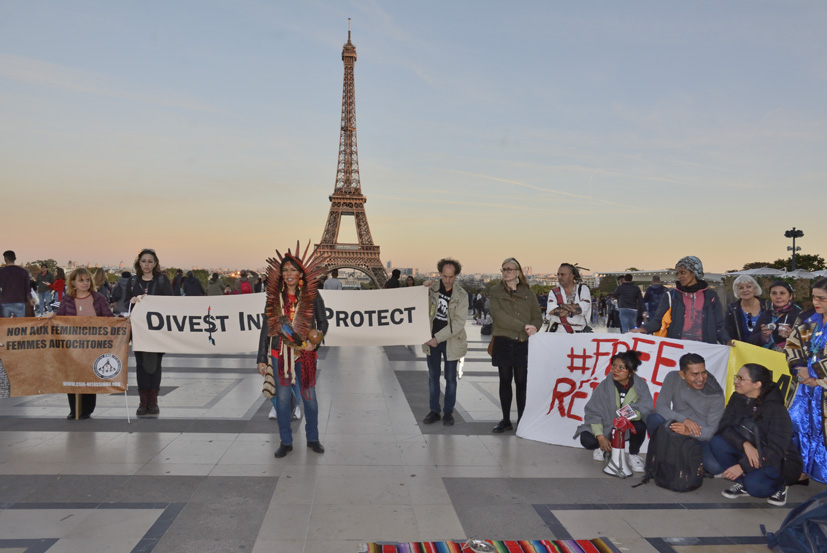 I shall introduce myself once more: I am Daiara Tukano, my people live at the border between Brazil, Colombia and Venezuela. Our territory is at the very center of Amazonia and is confronted with a situation of violence that never stopped since 1630, when the first Portuguese very quickly sailed upstream on the Amazon River. The colonization was very hard, very strong. They have always been seeking to exploit that Eldorado vision, that never stops, even on the Gold Mountains [‘Montagne d’Or’ is a disastrous mining project in the rainforest, in ‘French’ Guiana], and to force upon us a culture that, until today, has been denying our identity, our knowledge, and depicting our cultural practices as being from the Devil. Thus, we consider that the Indigenous Movement in Brazil always existed. For instance, my parents belong to that generation which, during the 1960’s, 1970’s and 1980’s, managed to build, on a constitutional level, recognized original rights that supersede all other rights, which are inviolable, which should be inviolable. However, the Brazilian State – not only the Federal Republic of Brazil, but the Empire and the Portuguese Crown before it, which also had policies toward Indigenous Peoples – never respected any agreement, any treaty, not even their own Constitution. Thus, today, more than ever, we are confronted with a violence that increases every day. Our country is huge, and it does not only include Amazonia. Of course, I come from a People that lives in Amazonia, but the Indigenous issue is not limited to Amazonia. Brazil is an almost continental country and the Indigenous population is everywhere. 40% of the Indigenous population lives outside Amazonia today, because that population lost its forest, lost its territory, which has been stolen, invaded. And this population is still submitted to violence by the same people, from the agribusiness, mining, and, even more now, under this government, self-declared extreme-rightist, which promotes ‘positive integration’, thus assimilation of Original Peoples’ culture. For instance, we have right now a Minister of Human Rights in Brazil, who is absolutely against Human Rights, on basis of a religious discourse – being herself from a neo-Pentecostal church, an evangelist – that still goes on, in the XXIst century, demonizing traditional practices, ‘denouncing’ violent practices that never existed, as infanticide for instance, and saying that for the sake of the traditional Christian family, we must be integrated into that society.
I shall introduce myself once more: I am Daiara Tukano, my people live at the border between Brazil, Colombia and Venezuela. Our territory is at the very center of Amazonia and is confronted with a situation of violence that never stopped since 1630, when the first Portuguese very quickly sailed upstream on the Amazon River. The colonization was very hard, very strong. They have always been seeking to exploit that Eldorado vision, that never stops, even on the Gold Mountains [‘Montagne d’Or’ is a disastrous mining project in the rainforest, in ‘French’ Guiana], and to force upon us a culture that, until today, has been denying our identity, our knowledge, and depicting our cultural practices as being from the Devil. Thus, we consider that the Indigenous Movement in Brazil always existed. For instance, my parents belong to that generation which, during the 1960’s, 1970’s and 1980’s, managed to build, on a constitutional level, recognized original rights that supersede all other rights, which are inviolable, which should be inviolable. However, the Brazilian State – not only the Federal Republic of Brazil, but the Empire and the Portuguese Crown before it, which also had policies toward Indigenous Peoples – never respected any agreement, any treaty, not even their own Constitution. Thus, today, more than ever, we are confronted with a violence that increases every day. Our country is huge, and it does not only include Amazonia. Of course, I come from a People that lives in Amazonia, but the Indigenous issue is not limited to Amazonia. Brazil is an almost continental country and the Indigenous population is everywhere. 40% of the Indigenous population lives outside Amazonia today, because that population lost its forest, lost its territory, which has been stolen, invaded. And this population is still submitted to violence by the same people, from the agribusiness, mining, and, even more now, under this government, self-declared extreme-rightist, which promotes ‘positive integration’, thus assimilation of Original Peoples’ culture. For instance, we have right now a Minister of Human Rights in Brazil, who is absolutely against Human Rights, on basis of a religious discourse – being herself from a neo-Pentecostal church, an evangelist – that still goes on, in the XXIst century, demonizing traditional practices, ‘denouncing’ violent practices that never existed, as infanticide for instance, and saying that for the sake of the traditional Christian family, we must be integrated into that society.
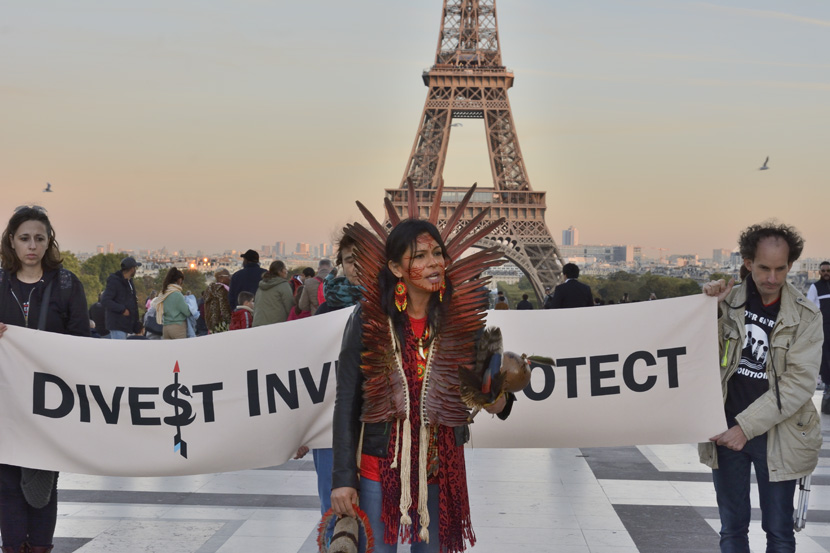 Thus, the discourse never changed for 519 years and violence only increases, as well as our invisibility and the denial of our identities, of our territories, that seems to be perpetual. This is why the movement always existed, and why Democracy, for us, has never been there. In Brazil, I don’t know where that so-called democracy is supposed to exist. Democracy exists only for those who have the economical power, it never existed for Indigenous Peoples. Thus, we don’t have any reason to trust the State or any institution, be it national or international, to obtain the respect and guarantee of the rights we demand as human beings. Because we ARE human beings. And our humanity is constantly violated in all kinds of ways. This is why our movement, today, is a movement demanding that rights that have been defended by the Constitution be respected. But should those rights not be respected, we shall implement them ourselves. This is the reason why I, personally, usually say that the ‘de-colonial’ idea is great, but de-colonizing has to be done by the colonizer. While we counter-colonize, by affirming our identity, recognizing our territory, stay on our territory, on all our territories, despite of all violence. The best example is that of the Peoples living outside of Amazonia. They are Peoples who, at a point in their history, saw their territory stolen, stolen by the State, sold by the Brazilian State to landowners. It is what happened to the Guarani Peoples, who are now in a situation of taking their territories back. Thus, on the Internet, you will find media claiming that ‘Indians are invading poor farmers’ properties’. Of course, those are private properties bought by families or given away by the State, or sold for almost nothing, for a banana price, ignoring that those territories were inhabited by Indigenous populations, and that those populations have been submitted to slaves’ conditions, to sexual violence, psychological violence and alienation of our identities. Thus, we are taking back. We are taking back our territories, we affirm our identity, and if the institutions, the non-native laws – the White never have reliable laws – what does legitimate what is happening? Those laws have never been respected, they are laws for nothing, they only exist on paper. But nobody respects their papers. Thus, what we do is work to remain alive. If it is sometimes necessary to defend our territory with our body, we do it. So, very soon, in November, a delegation of Indigenous Peoples of Brazil, including the main representatives of regional Indigenous organization – there are five regions in Brazil – a delegation of 15 people, will come to Europe, to several cities including Paris, to talk about a divestment campaign from big companies and international lobbies – like the soya lobby, the sugar cane lobby, beef and mining lobbies – and to expose, unmask the banks which are investing in genocide, the death industry, and wake up the European population about YOUR responsibility in all those Human Rights violations that are still going on in our territories. If Europe remains the main investor for those who promote all kinds of violence, while you still claim to be that space from where the so-called democracy originates, we should work together to fight them. To defend democracy in our lands means to defend democracy worldwide. To believe in the existence of Human Rights means to ensure that those Rights are respected everywhere in the world, not only at home. Thus, everywhere. Thus, if today, agribusiness, mining industry are killing entire populations, terminating civilizations, polluting all the waters of this planet, everybody suffers from the consequences of that violence, we are on the same ship and we have to work together. This is the message I wish to transmit. I hope that we shall be able to build, from now on, a true exchange. Thanks to you all.
Thus, the discourse never changed for 519 years and violence only increases, as well as our invisibility and the denial of our identities, of our territories, that seems to be perpetual. This is why the movement always existed, and why Democracy, for us, has never been there. In Brazil, I don’t know where that so-called democracy is supposed to exist. Democracy exists only for those who have the economical power, it never existed for Indigenous Peoples. Thus, we don’t have any reason to trust the State or any institution, be it national or international, to obtain the respect and guarantee of the rights we demand as human beings. Because we ARE human beings. And our humanity is constantly violated in all kinds of ways. This is why our movement, today, is a movement demanding that rights that have been defended by the Constitution be respected. But should those rights not be respected, we shall implement them ourselves. This is the reason why I, personally, usually say that the ‘de-colonial’ idea is great, but de-colonizing has to be done by the colonizer. While we counter-colonize, by affirming our identity, recognizing our territory, stay on our territory, on all our territories, despite of all violence. The best example is that of the Peoples living outside of Amazonia. They are Peoples who, at a point in their history, saw their territory stolen, stolen by the State, sold by the Brazilian State to landowners. It is what happened to the Guarani Peoples, who are now in a situation of taking their territories back. Thus, on the Internet, you will find media claiming that ‘Indians are invading poor farmers’ properties’. Of course, those are private properties bought by families or given away by the State, or sold for almost nothing, for a banana price, ignoring that those territories were inhabited by Indigenous populations, and that those populations have been submitted to slaves’ conditions, to sexual violence, psychological violence and alienation of our identities. Thus, we are taking back. We are taking back our territories, we affirm our identity, and if the institutions, the non-native laws – the White never have reliable laws – what does legitimate what is happening? Those laws have never been respected, they are laws for nothing, they only exist on paper. But nobody respects their papers. Thus, what we do is work to remain alive. If it is sometimes necessary to defend our territory with our body, we do it. So, very soon, in November, a delegation of Indigenous Peoples of Brazil, including the main representatives of regional Indigenous organization – there are five regions in Brazil – a delegation of 15 people, will come to Europe, to several cities including Paris, to talk about a divestment campaign from big companies and international lobbies – like the soya lobby, the sugar cane lobby, beef and mining lobbies – and to expose, unmask the banks which are investing in genocide, the death industry, and wake up the European population about YOUR responsibility in all those Human Rights violations that are still going on in our territories. If Europe remains the main investor for those who promote all kinds of violence, while you still claim to be that space from where the so-called democracy originates, we should work together to fight them. To defend democracy in our lands means to defend democracy worldwide. To believe in the existence of Human Rights means to ensure that those Rights are respected everywhere in the world, not only at home. Thus, everywhere. Thus, if today, agribusiness, mining industry are killing entire populations, terminating civilizations, polluting all the waters of this planet, everybody suffers from the consequences of that violence, we are on the same ship and we have to work together. This is the message I wish to transmit. I hope that we shall be able to build, from now on, a true exchange. Thanks to you all.
As an answer to a question from the audience, Daiara made of few more points. About the ‘civil disobedience’ strategy, pushed forward by some European groups, she said that to be born as a Native was already considered as a kind of ‘terrorism’ and that, for them, ‘to disobey simply means existing’. She further explained that some population groups in the world are privileged, and that having privileges implies responsibilities. She insisted on the fact that the forest depends on the existence of Indigenous Peoples, who feel responsible for it and do their part of the job. She reminded the audience that the country that kills the most Human Rights and Nature Rights defenders in the world is Brazil. Indigenous peoples are in the frontline to defend Nature with their lives. She also pointed out that 80% of the biodiversity on the planet is in Indigenous territories. She thus remarked that cultural diversity was as important as biodiversity, as they depend on each other.

